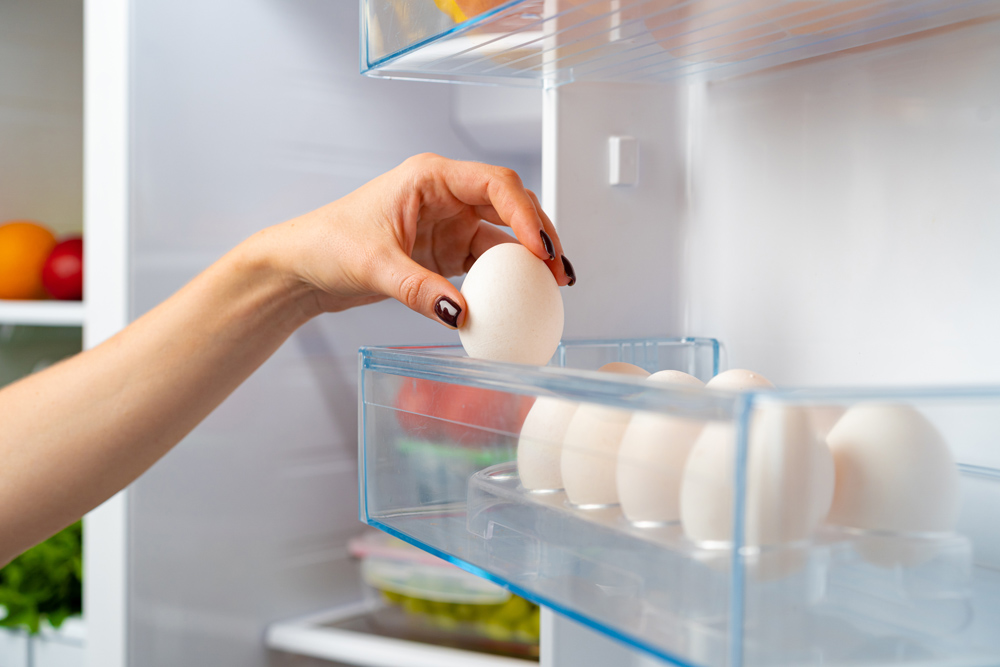Table of Contents (click to expand)
Eggs should be stored in a cool place with a consistent temperature. The formation of condensation on the egg shell allows bacteria on the egg shell to enter into the egg through pores in the shell.
Eggs are a globally loved ingredient. Whether it’s a fluffy bacon and cheese omelette, a scrambled egg on toast or a fried egg on top of a juicy burger, eggs are an excellent protein source. However, you have to be careful when handling eggs, whether they’re farm to table or store-bought.
Eggs are easy to spoil if not handled correctly. Depending on your location and the container instructions, you may be told to keep them in a cool and dry place or in the fridge… but why is it so necessary to store eggs correctly?
Why Do Eggs Need Proper Storage?
Why are eggs so great to eat? It’s not just because they’re delicious. Eggs are rich in lipids, proteins, minerals and vitamins. The protein content is equally divided amongst the egg yolk and white, and there are hundreds of kinds of proteins. However, only the yolk contains the lipids, minerals and vitamins (especially vitamin C).

Eggs are so nutritious that our microscopic friends, bacteria, love them too. Of the potentially hundreds of bacteria that could be found in an egg, the one we primarily need to be wary of is Salmonella enteritidis. It’s a bacteria that can cause food poisoning and upsets our tummies if it infects us.
Chickens lay eggs through a vent-like opening called a cloaca, which is the equivalent of our anus. It’s also the same opening that they use to poop and pee. Salmonella species are found in chicken poop and a chicken’s reproductive tract. Because of this, the eggs can come in contact with Salmonella as it passes through the cloaca or from the chicken poop lying around in the nest.
It doesn’t end there though. Eggshells are also porous to allow oxygen from the environment to pass through to the baby embryo inside the shell. These bacteria can also penetrate these pores and infect the inner layers of the egg. That’s why it’s safer to always cook your eggs before eating them.

Don’t be alarmed though, as all eggs are washed and sanitized thoroughly before being packed and sold. There are strict food and safety regulations that egg sellers must follow. However, this washing process weakens the eggshell’s protective covering. After washing, the eggs may be bacteria-free, but they are still vulnerable to future bacterial invasions.
If you’re buying unwashed farm-to-table eggs or growing them yourself, remember to wash the eggs with running warm water (at least 10°C/50°F higher than the egg’s temperature) before storing or using them.
However, washing can only do so much. It can rinse away the bacteria lying on the shell, but not the ones that found safety in the eggshell’s pores. These are particularly hard to get rid of.
That’s why it is recommended that you store eggs in the fridge.
Also Read: What Happens When An Egg Is Boiled?
Why Does Refrigeration Help?
Are you a cold-weather fan? Well, bacteria aren’t. They usually don’t grow well in the cold. They use all their energy to stay warm, rather than grow and multiply.
The average temperature of a fridge is 4°C (39°F). Studies have shown that storing eggs at 4°C inhibits Salmonella growth. It’s not just Salmonella; other food-spoiling bacteria like E.coli don’t grow at such cold temperatures either.
So, later on, if any bacteria were to come in contact with the eggshells, they won’t grow and infect the eggs if they’re kept in the fridge. On the other hand, eggs kept in the open are more favorable to bacterial growth. It’s a more comfortable temperature for them.

Now, this doesn’t mean bacteria don’t grow at all in the fridge, but they grow SLOWLY. That’s why egg cartons usually say “best before six weeks if stored in the fridge”. Please don’t use two-month old refrigerated eggs for baking a cake… they’ll probably be rotten by then!
In some countries, like the U.K., people keep their eggs out in the open. However, their case is a little different. Chickens in the U.K. are vaccinated against Salmonella and their health is strictly monitored. They have Salmonella-free chickens, so their eggs aren’t commonly exposed to Salmonella species. This makes the eggs safer to store in cool dry places like the kitchen pantry. However, they can’t be kept for six weeks in a pantry either. It’s best to keep them in a fridge if you plan to make them last for a few weeks.
In the U.S, Salmonella is much more common, which is why the FDA recommends buying eggs from a refrigerated store and storing them in the fridge as soon as you get home. This point is crucial if you’re buying refrigerated eggs. Once they’re kept in the refrigerator, they should not be left out for too long.
Also Read: Why Does Food In The Fridge Stay Fresh For Longer?
Why Should You Not Leave Refrigerated Eggs Outside?
Have you ever sat in a freezing air-conditioned room or car, only to step out in the open and find your glasses, phone screen or watch fogging up? That’s the result of condensation. The same phenomenon occurs when you keep a refrigerated egg outside. The surrounding water vapor condenses and a water layer forms on the eggshell.
This sudden temperature fluctuation and water formation is a thriving space for bacteria. This is an excellent environment for them to grow… and they grow fast! Salmonella species can double in number at room temperature in a couple of hours. Additionally, the moisture makes it easier for the bacteria to penetrate the eggs.
So, if you’re buying cold eggs from your local grocery store, don’t wait too long to put them in your kitchen fridge.

Another helpful tip is to store eggs in the carton at the back of the fridge. Don’t keep them by the fridge door. Otherwise, every time you open the fridge, outside air and moisture comes inside and this temperature change can cause water vapor to form on the egg. Keeping the eggs in the original carton protects the eggs from moisture and stops other odors from neighboring food items from penetrating the eggshell. In short, eggs stay fresher if kept in the carton.
Also Read: What Happens When You Put Hot Food In The Fridge?
Conclusion
Keeping eggs in the fridge can preserve them for about a month and a half. That doesn’t mean keeping them in the freezer will make them last longer. Frozen yolks become thick and gel-like, making them difficult to cook later after thawing. Furthermore, the eggshells can crack in extreme temperatures. Cracked open eggs can be stored in the freezer for months ONLY if kept in airtight containers. However, their quality does decline over time.
Ideally, the best way to store your eggs is to keep them in the fridge. However, if you don’t like working with cold eggs, you can keep them in a cool, dry place. Just remember to use them within a few days, or they could spoil.
Eggs are always a source of interest because they’re a cheap source of nutrients. A future possibility that may arise is designer eggs. These eggs are scientifically enriched with omega-3 fatty acids and antioxidants. This modification would make eggs more nutritious, easier to store and safer to eat!
Also Read: Can Frozen Foods Be Stored Indefinitely?
How well do you understand the article above!

References (click to expand)
- Réhault-Godbert, S., Guyot, N., & Nys, Y. (2019, March 22). The Golden Egg: Nutritional Value, Bioactivities, and Emerging Benefits for Human Health. Nutrients. MDPI AG.
- Koppel, K., Suwonsichon, S., Chitra, U., Lee, J., & Chambers IV, E. (2014, January 16). Eggs and Poultry Purchase, Storage, and Preparation Practices of Consumers in Selected Asian Countries. Foods. MDPI AG.
- Cardoso, M. J., Nicolau, A. I., Borda, D., Nielsen, L., Maia, R. L., Møretrø, T., … Teixeira, P. (2021, May). Salmonella in eggs: From shopping to consumption—A review providing an evidence‐based analysis of risk factors. Comprehensive Reviews in Food Science and Food Safety. Wiley.
- Shell Eggs from Farm to Table | Food Safety and Inspection .... The Food Safety and Inspection Service
- What You Need to Know About Egg Safety - FDA. The United States Food and Drug Administration
- Salmonella enteritis Infection - CDC WONDER. The Centers for Disease Control and Prevention
